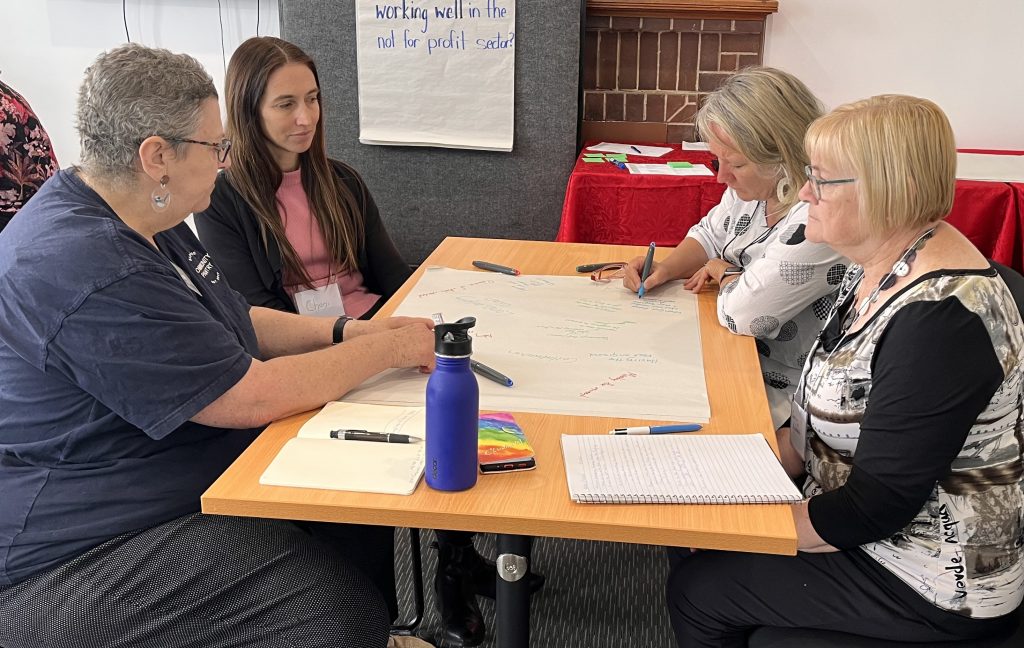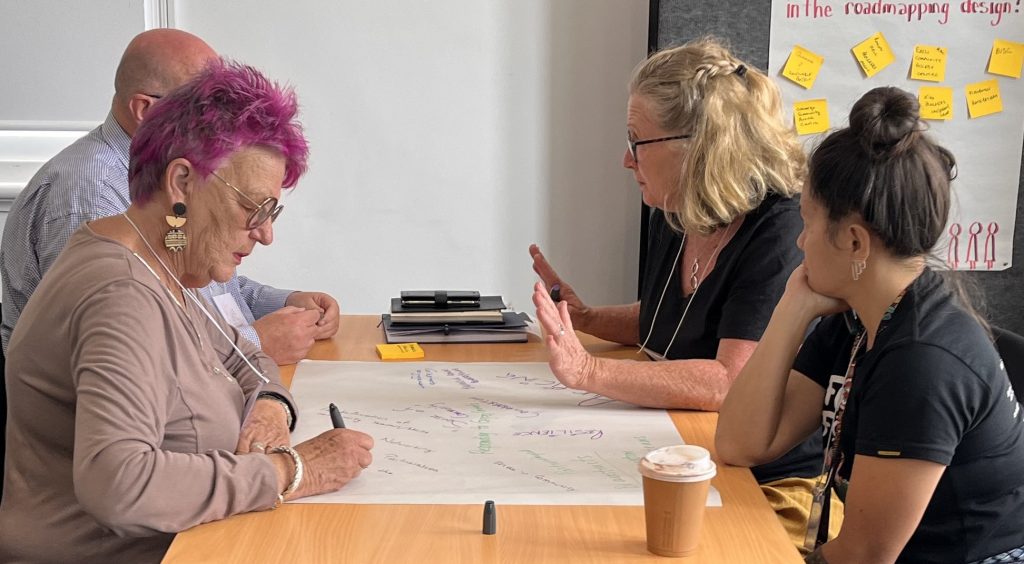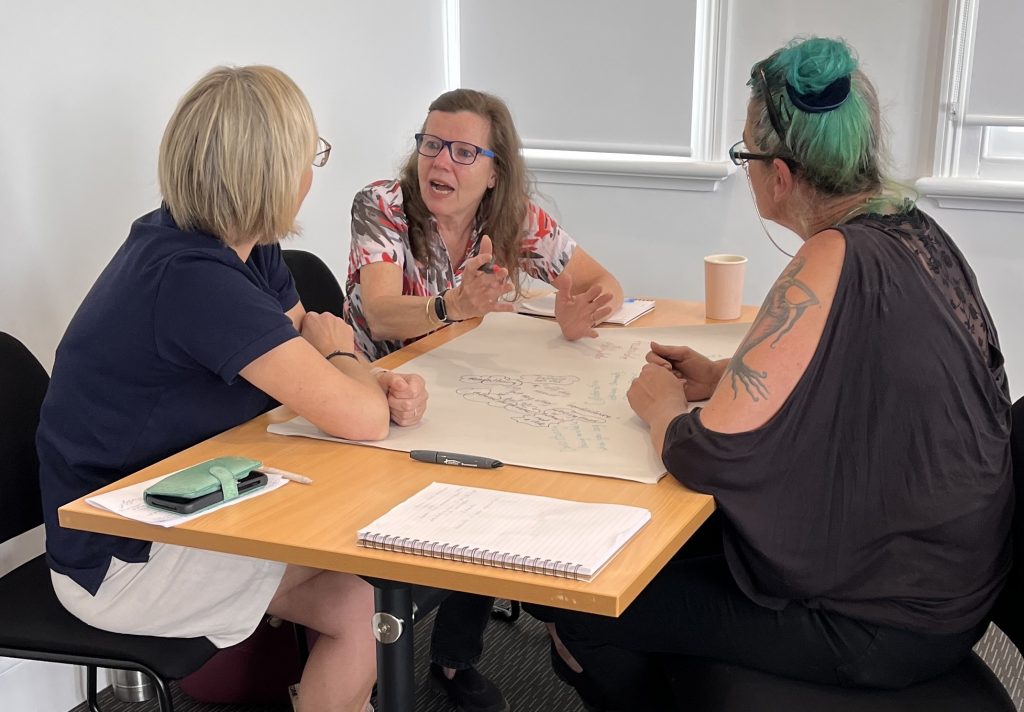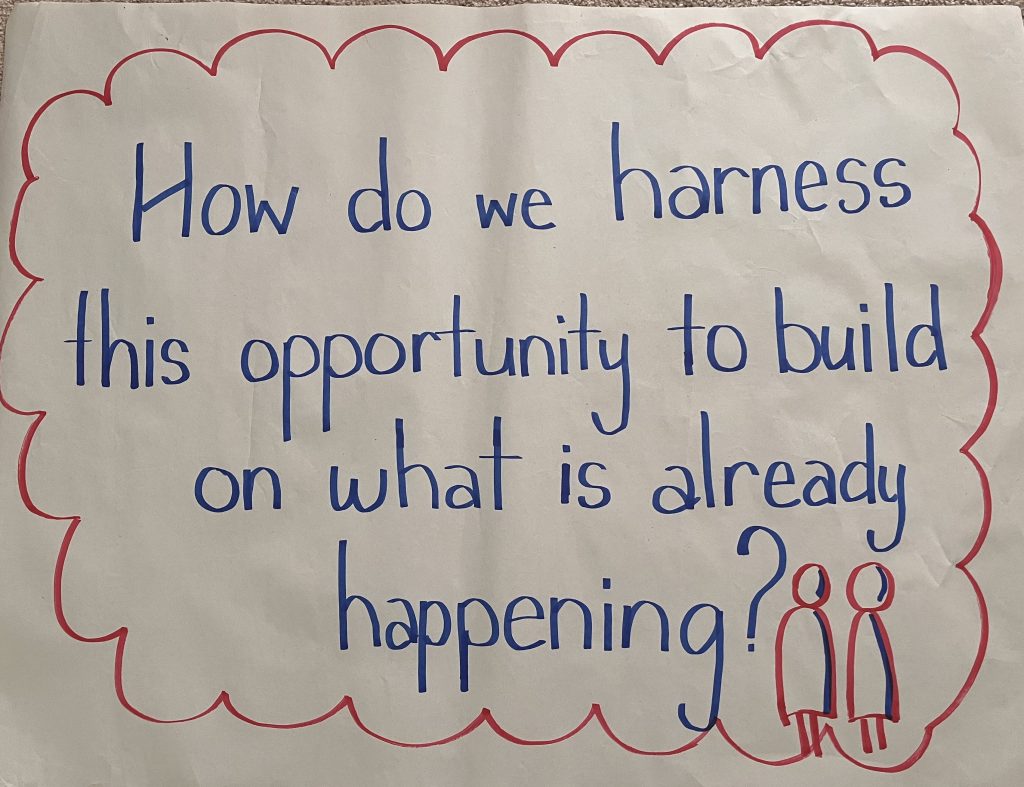Bega – Resilience, Connection and Place Workshop
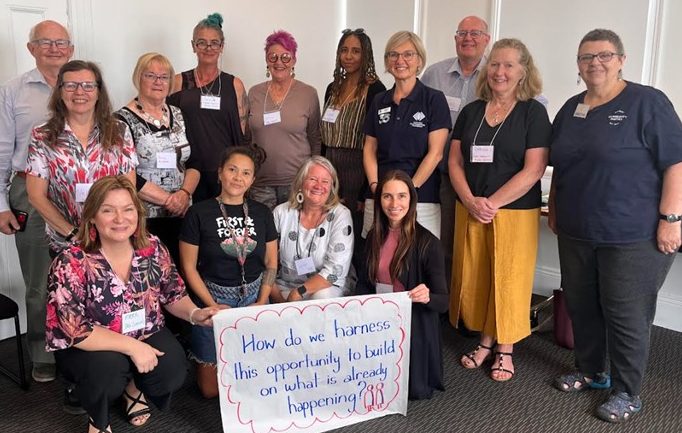
Friday 8 December
Eleven amazing community members from the Bega Valley gathered to explore the question “How do we harness this opportunity to build on what is already happening?”
This workshop was identified as key preparation ahead IRCF (Investing in Rural Community Futures) plans for 2023. The harvest from this workshop, will be consolidated with the previous community volunteer workshop supported by the Paul Ramsay Foundation. This will form part of the input for the Bega Valley Community Roadmapping in March 2023.
This workshop was funded by the Australian Government, and hosted by Carolyn Ardler, Deb Samuels & Monique Carson from FRRR, along with Chani Keefer from Bega Valley Council. It was also a delight to have our partner attending from Australian Rural Leadership Foundation (ARLF), Marissa Clift
We captured these reflections and have shared them below.
How are you arriving today?
Here’s a summary of responses to our check in, identifying how participants were arriving:
• Enthusiastic
• Hopeful
• Excited – build networks, breakdown barriers incl the geographical boundaries
• Curious
• Curious & Excited about what will step into this space today
• Supported & Grateful – Excited about what happens locally.
• Open – to new possibilities and projects from today & beyond
• Grateful – collaborative community approach
• Joyful – Heart people bring in when we think of community
• Hopeful – Continuation of $ to support small groups
• Burnt-out & Hopeful
• Little stressed, but Hopeful about the opportunities to help small groups
• Ready to build on collaboration. Learn more & maintain respect
• Looking forward to learning new community needs
This project received grant funding from The Australian Government.

What have you seen or experienced that has worked well for NFPs?
In our first round of Café conversations, we uncovered what’s working now:
- Collaboration between community and council.
- Reducing duplication
- Collaboration and partnerships. Breaking down borders and silos.
- Systems for communications across groups
- Making small amounts of $ go a long way.
- Having the feet on the ground locally. Local Coordinators. Local knowledge. Locals helping locals.
- One on one support. Community Access centres.
- Being fluid and not rigid. Find the flexibilities in systems.
- The discovery of the wealth of social capital/skills and providing space for it to happen.
- Systems for communication across groups
- Asking for specific needs.
- Tapping into small or specific things
- Honest conversations. Empathy.
- Agility to respond to needs quickly, offer flexibility, be creative.
- Welcoming individuals for their diversity
- Innovation
- Storytelling
- Relational Relationships
Over the last few years, what were the gaps or obstacles?
We uncovered what else is needed or missing from our current services:
- Lack of Co-ordination in funding and service delivery
- No space between disasters
- Project support group across LGA
- Money
- Proper resourcing for projects
- Mental Health Support
- Central location of service to coordinate projects
- Premature deadlines and inconvenient time frames for Royal Commission Grants, programs and mental Health
- Lack of support for young people already marginalised prior to covid & bushfires
- Care and support for people in crisis (Including Disease & Burnout)
- Developing leaders
- Lack of specialist skills sets and retention/burnout for NFPs
- Funding for salaries
- Cohesion of training and outcomes
- Project to project exhaustion
How can we amplify what is working to meet emerging needs?
In Round 3, we explored the future possibilities for the Bega Valley. There was a large array of ideas captured off the butcher’s paper. These have predominately been grouped into 4 areas: People, Strategy, Efficiency, Systems. As well as some broader areas that cross all these:
- Broadly
- Building Capacity
- People
- Gentle steps to allow people opportunity for growth, tolerance and acceptance.
- Embed and thread mental health into activities and events design (e.g Cobargo Community Access Group)
- Amplify accessibility: People who care/safe space; People who listen and help; Programs & activities.
- Parties and Celebrations
- How to have conversations. Keep showing up. Value each other.
- Create space. Bring people into the space.
- Strategies
- Move focus (where and when appropriate) to move beyond the focus of bushfire recovery to broader community needs.
- Develop strategic plans
- Encourage critical thinking and new ideas. Allowing each other to fail (sometimes) and bounce back. Thought leadership.
- Efficiencies
- Continual pipeline of small grants/funds
- A Council/community owned bus shared by groups in community.
- Creating community hubs and connection points with no or minimal cost.
- Diversifying team skills
- Information sharing. Open, Honest, Transparent communication. Sharing success stories & challenges
- More collaboration. Interagency collaboration.
- Invite and use stories
- Collection of data to inform what’s worked and what is important.
- Don’t be scared to copy, replicate, scale existing solutions that are working here or elsewhere (Don’t reinvent the wheel)
- Relationship building. Share Story telling in wider space through various mediums (illustrative, visual, media, written). Social education, relationship building between groups.
- Stretching resources. Good at doing a lot with a little.
- Systems
- Rostering and Record keeping support
- Creating varied opportunities for meeting and networking. Reconnecting individuals and groups. Keeping people connected – relaunching important activities eg. Music groups.
- More promotion
- System sharing. Open source Access.
- More Access Centres
- Sharing the message of The Access/Neighbourhood centres. Highlighting the benefits/Values of these centres. Additional $ support for Neighbourhood + Access Centres.
- Social Media training
What do you need now and how much will it cost?
Following on from possibilities in Round 3, we asked the group to broaden the scope and be bold to think blue sky. Here are the fantastic ideas that emerged:
- Project Lab with a community development officer $300,000
- Bega access centre $800,000
- Funding for wages & Volunteer Vouchers, dinners.
- Funded role to support project ideas come to fruition. $250,000
- Mentoring group to share knowledge (for eg. Auspicing, Governance) $50,000
- Money for Salary
- A ‘Project Lab’ and coordinator to support community to develop community projects in Eden and surrounds. $300,000
- Community Centre and outreach services and transport for Bega, $800,000
- Funding to provide a common, shared service platform (HR, Volunteers, Zero Accounting etc) for small NFPs $100,000 business case, $300,000 start $100,000pa
Closing the day
As a check out, we asked people what are you taking away?
- The value of sharing
- Optimistic
- Fraternity/Sorority
- Warmth of heart
- Not so alone in our journey
- Heartening feeling of collaboration
- Feels light. People feel different. Sense of wonder about people and being together
- Enriched in time together
- Inhale of oxygen and energy is beautiful. The network of support to be apart of.
- Topics have created anchor points
- Revitalised
- Networking, connectedness and engagement
- Remembering who we service, the common purpose. That’s my oxygen.
Next Steps
- Carolyn – Share two new council roles to support the program. Link to ARLF program. Links to the IRCF website with other IRCF community updates.
- Monique – Share the Harvest from workshop discussions
- Roadmapping session with broader community in March 2023
Suggested invitees for 2023 Roadmapping
Ongoing opportunity to suggest organisations to attend the Roadmapping in March 2023:


